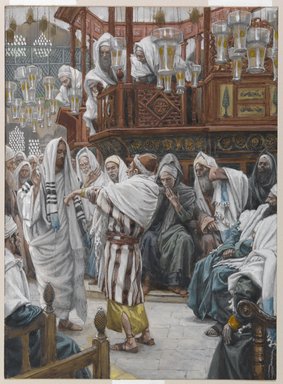Therefore what could they accuse Jesus of?.... Yet their immediate response was one of 'senseless' rage.

Posted on 02/10/2016 6:31:38 AM PST by Gamecock
"He said to them, 'Is it lawful on the Sabbath to do good or to do harm, to save life or to kill?' But they were silent. And he looked around at them with anger, grieved at their hardness of heart, and said to the man, 'Stretch out your hand.' He stretched it out, and his hand was restored" (vv. 4-5). - Mark 3:1-6
Having noted His authority over the Sabbath and proclaiming that it was made for the sake of human well-being, Jesus goes to the synagogue (Mark 2:23-3:1). Like the other Jews of His day, Christ presumably enters the synagogue on the Sabbath to worship God and study His law, but He is immediately presented with an opportunity to reiterate the purpose of the Sabbath and His authority over it. This opportunity comes in the form of a man with a "withered," or deformed, hand (3:1).
Once Jesus passes through the doorway into the synagogue, the people begin to wonder if He will heal the man's hand on the Sabbath. Doubtless, they are wondering because they have already seen Christ heal people in Capernaum on the Sabbath day (1:21-31). Moreover, they surely find themselves considering the propriety of healing on the Sabbath day. They have heard the Pharisees teach that the only kind of medical care that can be administered on the Sabbath is care required to save a life or prevent an injury from getting worse. A dislocated limb, for example, can be treated to prevent further harm, but it cannot be placed back into its socket until the following day. To cause healing in such a way is considered work by the Pharisees.
Jesus knows this, which is why He asks if it is lawful to do positive goods such as healing a non-life-threatening affliction on the Sabbath (3:2-4). And His healing the man demonstrates the lawfulness of providing healing or medical care on the Sabbath even when such treatment is unnecessary to save a life. This fits well with His statement that the Sabbath was made for man's well-being (2:27), as well as the fact that the restorative rest mandated on the Sabbath is analogous to restorative care of injuries and illnesses (see Ex. 20:8-11). Although the answer to Jesus' question should be obvious from any honest study of the law of God, the Pharisees refuse to answer. They refuse to say, "Yes, it is lawful to heal on the Sabbath," because that would mean acknowledging Christ's authority over that day, and they refuse to say, "No, it is unlawful to heal on the Sabbath," because they know their principle is wrong. Such hard-heartedness that refuses to confess known error demonstrates a deep-seated, wholehearted malice that is amazing to fathom, and it is no wonder that Jesus is furious at these wicked men (Mark 3:5).
Coram Deo
The Pharisees' meeting with the Herodians to plot Jesus' death confirms their evil (Mark 3:6). Dr. R.C. Sproul points out the irony in his commentary Mark: "Could there have been a worse way of violating the sanctity of the day God set apart for the well-being of His people than to plot to kill the Lord of the Sabbath on the Sabbath day?" Let us pray for the Lord to give us soft hearts and the willingness to obey Him even when it violates unbiblical traditions.
Passages for Further Study
Proverbs 28:14 Zechariah 7 Matthew 12:9-14 Hebrews 3:7-4:13
Ping!
Therefore what could they accuse Jesus of?.... Yet their immediate response was one of 'senseless' rage.


We're even seeing this in our election this year and was prevalent in Obama’s election as well. Everyone’s looking for the showman today....in every venue of leadership. Had Jesus come and walked this earth at this time he would never had drawn the crowds.....with just a word.....he would have been ignored without pageantry and drama.
Disclaimer: Opinions posted on Free Republic are those of the individual posters and do not necessarily represent the opinion of Free Republic or its management. All materials posted herein are protected by copyright law and the exemption for fair use of copyrighted works.